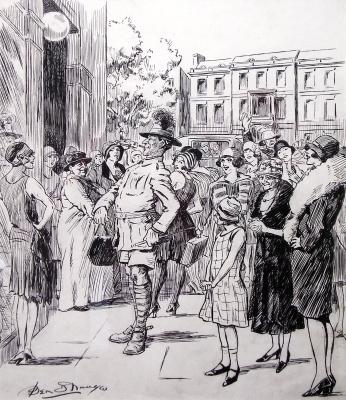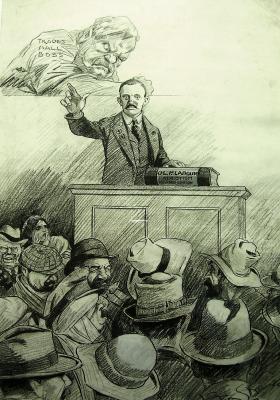CARTOON - HIS TROUBLE
1916Scene is in a library. In the foreground is a man sitting at a table with two books in front of him and a bag of money. He is wearing glasses and has his right hand up to his face adjusting his glasses. Text on the top book reads [DOLLARS / AND / CENTS]. Behind him and to the right is another table with a woman sitting at a typewriter, with the American flag around her waist. On the left side of the room are a set of double doors. Holding the doors closed is a women in a long dress with [CIVILISATION] written on it. Spikes are coming through the door. Text above the door reads [THE ALLIES].
Ben Strange signature bottom left corner.
HIS TROUBLES
When the cartoon was published in the Western Mail on 9 June 1916 it featured the caption:
Never mind the disturbance outside Miss Columbia - it is no concern of ours. Tell Bernstaf the relatives of the last batch of sub-marine Americans are making an awful fuss.'
The Cartoon
Many of Strange’s cartoons and cartoonlets are scathing of the neutral stance adopted by President Wilson and the USA during the first half of WW1.
The cartoon shows Woodrow Wilson sitting in a library with a book titled ‘Dollars & Dimes’ and a bag of money, dictating a letter/memo to his secretary, Miss Columbia, who has the US flag at her waist. Meanwhile ‘Civilisation’, depicted as a young woman, and the Allies, represented by the door, hold back knife-wielding attackers who are just outside the room. Blood and smoke can be seen oozing underneath the door. Wilson construes this as a ‘disturbance’.
Wilson’s letter/memo is directed to Bernstorf who was the German Ambassador to the US from 1908 to 1917. Wilson is unconcerned about the threat posed to civilisation by the barbarians at the door. Instead he asks, quite benignly, for Bernstorf to ‘please explain’ why the Germans are murdering Americans via their submarines - although with very little anger. He seems more concerned about the fuss being made by the relatives rather than by the act itself. His focus is instead on financial considerations.
The suggestion in the cartoon is that the USA is benefiting economically from the war, despite the barbarous acts committed by Germany against American citizens - for example on the RMS Lusitania which was torpedoed by a German U Boat on the 7 May 1915 with 128 Americans on board. The title of the cartoon therefore, ‘His Troubles’, is meant ironically. While civilisation is under threat, the USA is focussed on how to improve their economic situation.
Historical Background
Wilson’s view on the war was that America’s impartiality was important for a number of reasons. This was spelled out in his August 1914 Presidential Address to the Congress. Given the large immigrant population in the USA, involvement in the War might pit Americans of German ancestry against those with British and French ancestry. Involvement in the war, according to Wilson, would divide citizens against one another. As well, Wilson believed that by remaining impartial the US would be able to act as a mediator in any peace talks. Wilson also argued that the US economy would benefit from impartiality as they would be able to provide European nations with food and supplies.
Certainly, the US economy grew dramatically during the early years of the war. At the beginning of the war the value of US goods shipped overseas per annum was $500 million, and by 1917 this had increased to $3.5 billion. per annum. In particular the weapons industry took off and trade with the Allied nations doubled during the course of the war.
Despite the neutral stance of the US there were strong links between many US citizens and the Allied nations. This became even stronger when Germany adopted a policy of attacking neutral shipping with submarines. Also, trade with Germany became more and difficult as the British navy blockaded German ports. Sympathies in the US were primarily with the Allies.
It should be remembered that Wilson’s neutral stance is credited with his re-election as President in 1916. Historians believe that his campaign slogan ‘He kept us out of the war’, won him numerous popular votes. Wilson did attempt to end the war through mediation following his re-election. As the war progressed, however, this neutral stance became harder to maintain especially when German U Boats stepped up their attacks on neutral shipping early in 1917. On the 2 April 1917, Wilson asked Congress for a declaration of war. Before a joint session of the two houses he declared, "The present German submarine warfare against commerce is a warfare against mankind. It is a war against all nations. . . . We are accepting this challenge. . . . The world must be made safe for democracy." On the 6 April 1917, Congress declared war.
Details
Details
Artist's signature bottom left [Ben Strange]
HIGH
The Ben Strange cartoons are historically significant as they depict many key figures linked to the history and development of both Western Australia and Australia. Political figures who regularly appeared in his cartoon’s included John ‘Happy Jack’ Scaddan, the Premier of Western Australia from 1911 until 1916, and William ‘Billy’ Hughes, the Prime Minister of Australia from 1915 to 1923.
City of Armadale - History House
City of Armadale - History House
Other items by Ben Strange
- CARTOON - BEAR WITH CAP SITTING ON MAN
- CARTOON - THE CRUCIFICTION OF REASON
- CARTOON - SLUMDOM
- CARTOON - IN PRAISE OF BEAUTY
- CARTOON - FINANCIAL RETURN
- CARTOON - THE SAME OLD COW ON THE LINE
- CARTOON - LABOUR REFORM
- CARTOON - TWO OF A KIND
- CARTOON - INDUSTRIAL WRECKERS
- CARTOON - THE LAW OF THE SUSPECT CALUMNY
- CARTOON - THE GREAT PEACE POSTER
- CARTOON - THE SIMPLE LIFE
Other items from City of Armadale - History House
- CARTOON - TEMPTING GOOD - A BERLIN SHOWCASE
- CARTOON - A DANGEROUS OCCUPATION
- CARTOON - STARVATION IN EUROPE
- CARTOON - SILENCE IS NOT ALWAYS GOLDEN - AND THE LAW MAKES A POOR CUPID
- CARTOON - WHEN CONSTABULARY DUTYS TO BE DONE - A POLICEMANS LOT IS NOT A HAPPY ONE
- CARTOON - A LITTLE BABY WITH A BIG BOTTLE
- CARTOON - THAT MALIGNANT GROWTH
- CARTOON - THE WATCH DOG
- CARTOON - SIR WALTERS NEW MASH
- CARTOON - SANTA CLAUSE AND THE SILVER LINK
- CARTOON - ADRIFT - DROPPING THE PILOT
- CARTOON - THE LONG TREK FROM THE NORTH


